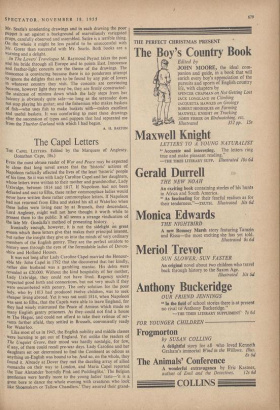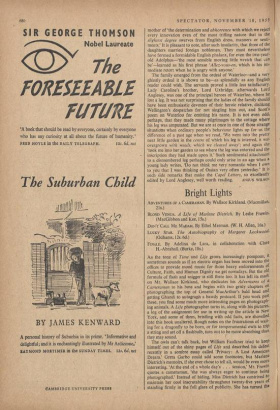The Capel Letters
THE CAPEL LETTERS. Edited by the Marquess of Anglesey. (Jonathan Cape, 18s.)
EVEN the most obtuse reader of War and Peace may be expected to close that long novel aware that the 'historic' actions of Napoleon radically affected the lives of the least 'historic' people of his time. So it was with Lady Caroline Capel and her daughters, Whose letters were written to their mother and grandmother, Lady Uxbridge, between 1814 and 1817. If Napoleon had not been defeated and sent to Elba, these rather commonplace ladies would never have written these rather commonplace letters. lf Napoleon had not returned from Elba and staked his all at Waterloo when these ladies were living near by at Brussels, their descendant, Lord Anglesey, might well not have thought it worth while to Present them to the public. It all seems a strange vindication of the late Mr. Guedalla's method of presenting history.
Ironically enough, however, it is not the sidelight on great events which these letters give that makes their principal interest, but rather the insight they give us into the minds of very ordinary members of the English gentry. They are the perfect antidote to history seen through the eyes of the formidable ladies of Devon- shire and Holland Houses.
It was not long after Lady Caroline C'apel married the Honour- able Mr. John Capel in 1792 that she discovered that her kindly, rather dim husband was a gambling maniac. His debts were revealed as £20,000. Without the kind hospitality of her mother, Lady Uxbridge, they could not have lived. Regency society respected good birth and connections, but not very much if they were encumbered with penury. The only solution for the poor lady, who by 1813 had produced twelve children, was to seek cheaper living abroad. Yet it was not until 1814, when Napoleon was sent to Elba, that the Capels were able to leave England, for they had wisely mistrusted the Peace of Amiens which made so many English gentry prisoners. As they could not find a house In The Hague, and could not afford to take their retinue of ser- vants farther afield, they settled in Brussels, conveniently ready for Waterloo.
Like most of us in 1945, the English nobility and middle classes were bursting to get out of England. Yet unlike the readers of The Unquiet Grave, their mood was hardly nostalgic, for few, if any, of them could recall pre-war days. Lady Caroline and her daughters set out determined to find the Continent as odious as anything un-English was bound to be. And so, on the whole, they found it. Already at Dover they met the dazzling array of allied monarchs on their way to London, and Maria Capel reported the Tsar Alexander 'horridly Pink and Puddinglike.' The Belgian gentlemen were hardly more to the young ladies' taste—It is a great bore to dance the whole evening with creatures who look like Shoemakers or Tallow Chandlers.' They assured their grand-
mother of 'the determination and abhorrence with which we reject every innovation even of the most trifling nature that in the slightest degree swerves from English dress, manners or senti- ments.' It is pleasant to note, after such insularity, that three of the daughters married foreign noblemen. They must nevertheless have formed a formidable English phalanx, for even the two-year- old Adolphus—`the most sensible moving little wretch that can be'—learned as his first phrase 'Allez-vous-en, which is his im- mediate retort when he is angry with anyone.'
The family emerged from the ordeal of Waterloo—and a very ghastly ordeal it is shown to be—as splendidly as any English reader could wish. The servants proved a little less satisfactory. Lady Caroline's brother, Lord Uxbridge, afterwards Lord Anglesey, was one of the principal heroes of Waterloo, where he lost a leg. It was not surprising that the ladies of the family should have been enthusiastic devotees of their heroic relative, disliking Wellington's despatches for not singling him out, and Scott's poem on Waterloo for omitting his name. It is not even odd, perhaps, that they made many pilgrimages to the cottage where his leg was amputated. But we are at once in one of those strange situations when ordinary people's behaviour lights up for us the difference of a past age when we read, 'We went into the pretty neat little garden in the centre of which his leg is interred, it was overgrown with weeds, which we cleared away'; and again she 'took me into her garden to see where the leg was enterred and the inscription they had made upon it.'•Such sentimental attachment to a dismembered leg perhaps could only arise in an age when a young lady writes, `Do not think me very romantic when I own to you that I was thinking of Ossian very often yesterday.' It IS such side remarks that make the Capel Letters, so excellently edited by Lord Anglesey, well worth reading. ANGUS WILSON











































































 Previous page
Previous page